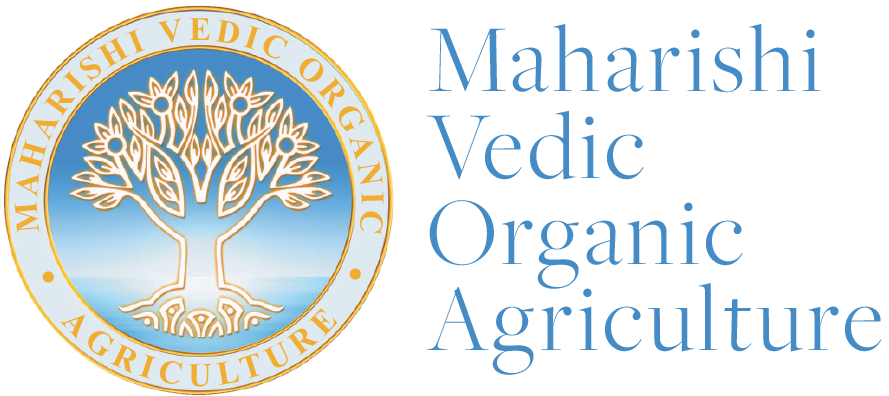Seven Pillars of a Vedic Agriculture Project
Life is holistic. For any project to be comprehensively beneficial to all life, it must take into account and nourish all aspects of life, throughout all levels of creation. This type of holistic approach is the special focus of Maharishi Vedic Organic Agriculture Projects.
The following are the seven pillars that support any Maharishi Vedic Organic Agriculture Project:
Pillar ONE
The Project must create fully vital, life-supporting food, grown in accord with all the Laws of Nature. The practice of Maharishi Vedic Organic Agriculture has, at its basis, sustainable, organic growing practices, both ancient and modern. These practices are then extended and enhanced to include the Maharishi Vedic Procedures of Farming and the Maharishi Technologies of Consciousness contained in the Maharishi Vedic Organic Agriculture Programme. In this manner the individual farmer is fully aligned with the local and cosmic environment in which he lives, and all the Laws of Nature are encouraged, supported, and directed to bring the full vitality of Nature into the food. Such food brings with it a new quality of life capable of creating health, vitality, happiness, and prosperity for the whole population. It is food that can sustain an enlightened, Vedic Consciousness in the whole society.
PILLAR TWO
The Project must be kind and supportive to the environment. Instead of depleting or polluting the resources of the area, a Maharishi Vedic Organic Agriculture Project replenishes them, creating a continually more vital and healthy environment.
PILLAR THREE
The Project should produce wealth for the participants, their community, and the nation as a whole. Maharishi Vedic Organic Agriculture recognizes that the Earth is like a loving mother, who is ready to give wealth in abundance to those who care for her and treat her with the respect due to the true provider of all our needs. Fulfilling wealth can be created from the Earth by enlivening all the Laws of Nature and channelling them for the benefit of crop and livestock production.
PILLAR FOUR
The Project should be beautiful, and inspire beauty and awe in its environment. The harmony and symmetry of the Maharishi Sthapatya Veda design and layout of the project should not only create waves of inspiration, but this harmony of design should, in itself, inspire cosmic creative intelligence to support the individual project and make it a true expression of the intelligence of Nature behind it.
PILLAR FIVE
The Project should create happiness. Maharishi writes that the purpose of life is the expansion of happiness. Any project on which we focus our life energies should in turn promote more happiness in our lives. It is on the basis of expanding happiness and a deep nourishing satisfaction that the project will naturally move forward and bring peace and prosperity to all involved.
PILLAR SIX
The Project should generate new knowledge in agriculture by combining the wisdom and insight into Natural Law from the traditional Vedic agriculture practices with the scientific practices of modern, organic agriculture. This new knowledge is what will elevate the project to higher and higher levels of success and allow each individual project to make a contribution towards a greater wholeness of knowledge.
PILLAR SEVEN
The Project should bring about the full personal development of all those involved, bringing richness and satisfaction to both heart and mind, leading to a state of enlightenment and fulfilment on the individual, national, and global levels.
“Nature reveals her secrets only to those who approach her with sympathy, respect, and understanding.”
Beginning & Managing a Maharishi Vedic Organic Agriculture Project
The Maharishi Vedic Procedures of Farming and Environmental Management, described above, are implemented and certified through the Maharishi Vedic Organic Agriculture Institute, and the Ministry of Agriculture of the Global Country of World Peace. They can be applied on individual farm projects, on village or area projects, or even on a state or national basis. These procedures are easy to implement, cost effective for any farming budget and effective for a comprehensive enhancement of all types of farming and agricultural activities.
Procedures for training farmers in the Transcendental Meditation® technique and TM-Sidhi programme will be provided by the authorized organizations teaching this programme in over 100 countries, under the guidance and supervision of Maharishi Vedic Organic Agriculture Institute. More information and contact details of the local Transcendental Meditation organizations can be found on www.globalcountry.org or www.tm.org or by contacting the international or regional offices of Maharishi Vedic Organic Agriculture Institute.
The Maharishi Vedic Agriculture Procedures of Farming and Environmental Management, including engaging the Vedic Pandits to perform Vedic recitations, will be arranged by the Maharishi Vedic Organic Agriculture Institute. The size of the project will determine the scale of the application of the procedures. Sufficient coherence has to be generated through the practice of the Vedic technologies of Consciousness in order to achieve the transformations that are required. This is a subtle and pervasive science, the knowledge of which is contained in the Vedic Yagya technologies themselves.
Individual farms, cooperatives, or agricultural and environmental projects wishing to begin this programme should contact the international of Maharishi Vedic Organic Agriculture Institute.
The practical steps are as follows:
1. The farm or project should contact Maharishi Vedic Organic Agriculture Institute to set up an implementation plan, which will include organizing the training of the programme participants in the Maharishi Technologies of Consciousness and the implementation plan for the Maharishi Vedic Agriculture Procedures of Farming and Environmental Management.
2. The project should ensure that the organic standards of the nation where the products will be sold have been implemented and certified.
3. Smaller farms and even community gardens can participate in the programme either individually or by forming cooperatives, whereby all the smaller units in the project can take part through this organisational structure.
4. Agricultural educational institutions and programmes can contact the MVOA Institute about courses and training programmes that can be offered in their institution, along with published materials explaining the theory and practice of Maharishi Vedic Organic Agriculture and Environmental Management.











